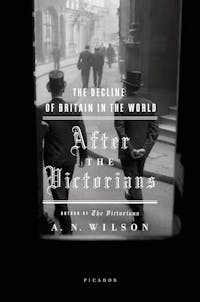After the Victorians
The Decline of Britain in the World
 Download image
Download image
ISBN10: 0312425155
ISBN13: 9780312425159
Trade Paperback
624 Pages
$31.00
A Guardian Favorite Book of the Year
The distinguished historian A.N. Wilson has charted Britain's rise to world dominance, a tale of how one small island nation came to be the mightiest, richest country on earth, reigning over much of the globe. Now in his sequel to The Victorians, he describes how in little more than a generation Britain's power and influence in the world would virtually dissolve.
In After the Victorians, Wilson presents a panoramic view of an era, stretching from the death of Queen Victoria in 1901 to the dawn of the Cold War in the early 1950s. He offers accounts of the savagery of World War I and the world-altering upheaval of the Russian Revolution. He explains Britain's role in shaping the destiny of the Middle East. And he casts a new light on the World War II years: Britain played a central role in defeating Germany but at a severe cost. The nation would emerge from the war bankrupt and fatally weakened, sidelined from world politics, while America would assume the mantle of dominant world power, facing off against the Soviet Union in the Cold War. Wilson's perspective is not confined to the trenches of the battlefield and the halls of parliament: he also examines the parallel story of the beginnings of Modernism—he visits the novelists, philosophers, poets, and painters to see what they reveal about the activities of the politicians, scientists, and generals.
Blending military, political, social, and cultural history, A.N. Wilson offers a portrait of the decline of one of the world's great powers. The result is an account of the birth pangs of the modern world, as well as a timely analysis of imperialism and its discontents.
Reviews
Praise for After the Victorians
"Aimed at the general reader, it is a ‘portrait of an age,' rather than an attempt at a comprehensive history . . . It is written with zest, and one of its best qualities is its unabashed use of literary sources as indicators of the Zeitgeist."—Richard Toye, Homerton College, University of Cambridge, History
"Cleverly organized, engagingly written, and rich in content."—The New York Times Book Review
"A work of affectionate memory . . . fueled by moral passion combined with irrepressible satire."—The Boston Globe
"As a sequel to The Victorians it is intended to share that outstanding book's aim of being a portrait of an age rather than a formal history. It succeeds brilliantly as both . . . It is a page turner, lambent with fascination . . . One of the best things about the book is the use Wilson makes of the period's reflection in its fecund literature. And, indeed, his masterly piece of history is a work of literature too."—Financial Times
"Readers who enjoyed the last volume will not be disappointed. After the Victorians has exactly the same compelling blend of political gossip, literary sketches and deft character portraits, given further spice by Wilson's own unorthodox and often utterly outrageous opinions . . . The sheer quality of his cracking prose . . . There is something simply irresistible about After The Victorians." —Dominic Sandbrook, The Daily Telegraph
"Wilson's narrative skills, eye for an anecdote, and entertaining style should ensure a considerable audience for this lively, provocative, and thoroughly idiosyncratic history."—The Wilson Quarterly
"Empires come and go, though seldom as suddenly and thoroughly as Great Britain's fall from world dominance. Many Britons celebrated Queen Elizabeth II's coronation in 1953 as a sign that all the rationing and shortages and general gloominess of the immediate postwar era were over. Wilson will have none of it: The coronation, he writes, was 'a consoling piece of theatre, designed to disguise from themselves the fact that the British had . . . lost an empire and failed to find a role.' If the collapse of empire seemed swift, it was a long time in coming; Wilson locates the decline in the trenches of WWI, in growing independence movements throughout the colonies, but especially in the backroom diplomatic angling of WWII, when putative allies seem simply to have outfoxed the clever British prime minister. 'All Churchill's cherished war plans—to guard and fight for the Eastern Mediterranean, to protect the British Empire by land in the Far East, to liberate Poland, and above all to establish a strong and united postwar Europe—were swept aside at Tehran by Roosevelt and Stalin,' Wilson writes. The world surely would have been different had it been otherwise, for, as Wilson argues early on, Britain, though conservative and monarchical, championed the ideals of personal liberty while supposedly revolutionary Russia and Germany destroyed them; though a few tried to assume the roles, Britain spawned no Hitler or Mussolini or Stalin of its own to struggle to keep its empire, and democracy endured. Throughout, Wilson writes appreciatively, and without false sentimentality, of the old England of bicycles and weekend picnics and Agatha Christie. A lucid companion to The Victorians, and a fine work of social history of a world gone by."—Kirkus Reviews
"Wilson—an estimable novelist and historian—has written a splendid sequel to The Victorians, describing the vanished world of his 'parents' generation' between 1901 and 1953 . . . Encompassing everything from high politics through middlebrow pursuits to low culture, this book displays Wilson's magpie-ish talent for the telling detail, the amusing anecdote and the wry observation to delightful effect." —Publishers Weekly



